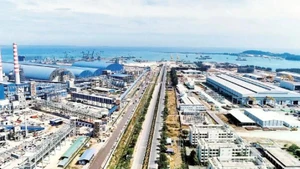At the end of 2024, Vietnam officially commercialised its 5G network, with Viettel and VNPT leading the way. Specifically, Viettel launched its 5G network on October 15, 2024, just six months after receiving its 2,600 MHz frequency license. Meanwhile, VNPT officially introduced its ultra-fast and ultra-experiential 5G service for VinaPhone users nationwide on December 20, 2024. Not lagging behind, MobiFone has also been granted a C3 band license and is rushing to complete procedures for early 5G commercialisation.
Positive movements
Recognising that Vietnam is gradually building a modern digital infrastructure to support the 5G network, Rita Mokbel, President of Ericsson Vietnam, stated that 5G will play a crucial role in driving the Fourth Industrial Revolution 4.0, attracting foreign investment, and boosting economic growth in Vietnam. At the same time, 5G has the potential to become a key transformative factor across multiple industries, enabling automation, productivity enhancement, and optimised resource management. The sectors expected to benefit the most include logistics, smart cities, and manufacturing.
Proportional to the rapid investment in modern and secure digital infrastructure, new opportunities for Vietnam's digital economy growth are emerging. Professor Tran Tho Dat, Chairman of the Scientific and Training Council at the National Economics University, stated that Vietnam's economy is transforming rapidly thanks to the adoption of new digital technologies, highlighting the significant potential of the digital economy in the coming years. Several industries are experiencing rapid digitalisation, including e-commerce, tourism, digital content, and financial technology. E-government and the digital society have also witnessed significant progress. Regarding the sectoral structure of the digital economy, the e-commerce industry has seen impressive growth, with an average annual growth rate of 16-30% over the past four years. This rate is 2.3 times faster than traditional e-commerce between 2022 and 2025, placing Vietnam among the fastest-growing e-commerce markets in the world. Over the past five years, Vietnamese businesses have significantly expanded their international reach. Many small and medium-sized enterprises (SMEs) have achieved annual revenue exceeding 1 million USD, with the number of exported products via international e-commerce platforms increasing by 300%. The startup ecosystem is also thriving, especially in the technology sector, with the number of tech startups growing rapidly, particularly in major cities such as Hanoi and Ho Chi Minh City.
The digital economy is permeating every activity of production, business, and consumption, fundamentally transforming the economic, cultural, and social life of the country. According to the United Nations' assessment, in 2024, Vietnam's E-Government Development Index (EGDI) ranked 71st out of 193 countries, improving by 15 positions compared to 2022, and ranked 5th out of 11 in Southeast Asia, up one spot. This was the first time Vietnam was classified into the very high EGDI group and achieved its highest ranking since it began participating in the assessment.
The remarkable progress in the EGDI ranking has contributed to improving the country's position, thereby promoting administrative reforms, increasing transparency in the activities of government agencies, and attracting better investment. Meanwhile, the digital transformation journey in the manufacturing sector — a field considered more challenging and costly for digital transformation — has also been recording an increasing number of success stories. One such example is Rang Dong Light Source & Vacuum Flask Joint Stock Company, which after just one year of digital transformation saw its high-tech product sales increase by 144% compared to the previous year. In 2024, the company was expected to achieve a revenue of about 11 trillion VND, more than 2.5 times higher than before the digital transformation. Digital technology has facilitated a breakthrough in labour productivity, competitiveness, and product quality for the company, and serves as the foundation for Rang Dong to set a new growth target of 20-25% annually for the 2025-2030 period.
It is forecasted that in the next five years, 5G networks will account for more than 50% of mobile subscriptions, becoming a key tool for Vietnam to achieve its goal of building a digital economy. It is expected to contribute 20% of the country's GDP by 2025.
Trial mechanism for digital economy
According to the Ministry of Information and Communications, Vietnam's digital economy is currently growing at a rate of approximately 20% per year, three times faster than the GDP growth rate. The share of the digital economy in GDP in 2024 is expected to reach around 18.3%, gradually progressing toward the goal of achieving a 20% share of the digital economy in GDP by 2025, as outlined in the National Strategy for Digital Economic and Digital Society Development by 2025, with a vision toward 2030, which was approved by the prime minister under Decision No. 749/QD-TTg. Digital transformation accelerated comprehensively during the 2021-2024 period, with tangible results contributing positively to the country's socio-economic development. The digital economy and digital society continue to grow strongly, and digital products from Vietnamese businesses are further developed and exported globally.
Professor Tran Tho Dat pointed out that despite challenges such as a shortage of high-quality human resources, uneven infrastructure, and issues related to cybersecurity and information security, Vietnam has a significant opportunity to become a digital economy hub in the region thanks to its young and dynamic population and the rapid development of new technologies. The primary advantage is the government's determination to accelerate the development of the digital economy, as evidenced by the early issuance of the national digital transformation programme/strategy and the development of the digital economy with specific goals to be achieved. On the demand side, the improvement in people's income and the country's population reaching 100 million, with a large proportion of young people, make Vietnam an attractive market for digital economy products and services.
International experience shows that to adapt to the rapidly changing landscape of the digital economy, regulations in various countries have had to focus on key areas such as the increasing role of regulatory agencies; the establishment of specialised agencies with new tasks; the growing need for coordination among agencies; and the innovation of policy approaches. Professor Tran Tho Dat suggests that the digital economy presents both opportunities and challenges, requiring research and evaluation on the new role of the state in ensuring that the digital economy operates in a suitable, effective, and healthy manner. In this context, perfecting and establishing institutions, policies, and legal environments is a continuous task that should receive the highest priority and be integrated into all tasks and solutions for developing the digital economy and digital society.
The development of a framework for the digital economy will play a decisive role in promoting innovation and ensuring equal legal compliance in the digital environment, helping to resolve conflicts arising from the growth of the digital economy. This framework includes rapid and sustainable development through pilot projects, refining models before upscaling them; developing a synchronised foundation for the digital economy while identifying key industries and sectors to focus on; ensuring a balance between innovation and the protection of privacy; and ensuring intellectual property rights in alignment with international practices and Vietnam's development reality.
According to Nguyen Minh Thao, Head of the Business Environment and Competitiveness Research Department at the Central Institute for Economic Management, the Government of Vietnam has been taking necessary steps to create favourable conditions for the development of the digital economy, including researching and establishing a legal framework to implement pilot mechanisms, experimental mechanisms, and special policies for new economic models based on science, technology, and innovation. However, the process of improving the institutions, mechanisms, and policies for the development of the digital economy needs to be further accelerated to achieve breakthroughs, including piloting new models that meet practical requirements and development trends.
"The digital economy has been bringing both opportunities and challenges, requiring research and evaluation of the new role of the state in ensuring that the digital economy operates in an appropriate, effective, and healthy manner. In this context, perfecting and establishing institutions, policies, and a legal environment is an ongoing task that needs the highest priority and should be integrated into all tasks and solutions for the development of the digital economy and digital society."
Professor Tran Tho Dat
Chairman of the Scientific and Training Council at the National Economics University
















